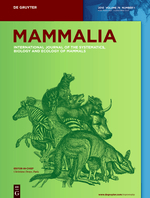
MAMMALIA
Scope & Guideline
Exploring the depths of mammalian biology.
Introduction
Aims and Scopes
- Mammalian Ecology and Behavior:
Research exploring the ecological roles, behavior, and conservation status of mammalian species across diverse habitats, including urban, rural, and protected areas. - Taxonomy and Systematics:
Studies focusing on the classification, identification, and evolutionary relationships of mammals, often revealing new species or revising existing classifications based on morphological and genetic data. - Conservation Biology:
Investigations into the threats faced by mammalian species, including habitat loss, climate change, and human-wildlife conflict, alongside strategies for conservation and management. - Physiology and Morphology:
Research on the physiological adaptations of mammals to their environments, including studies on morphology, reproductive strategies, and health assessments. - Human-Wildlife Interactions:
Exploration of the interactions between humans and mammals, including impacts of urbanization, hunting, and agriculture on mammalian populations.
Trending and Emerging
- Impact of Climate Change:
An increasing number of studies are focusing on how climate change is affecting mammalian distributions, behaviors, and ecological interactions, highlighting the urgency of understanding these impacts. - Urban Ecology and Wildlife:
Research examining how mammals adapt to urban environments and the consequences of urbanization on their populations and behaviors is gaining traction. - Genetic and Molecular Studies:
There is a growing emphasis on genetic research, including population genetics and phylogenetic studies, which are providing new insights into mammalian diversity and conservation. - Invasive Species and Their Impact:
The journal is increasingly publishing studies that investigate the effects of invasive mammalian species on native ecosystems, reflecting a global concern for biodiversity preservation. - Citizen Science Contributions:
Papers utilizing data collected through citizen science initiatives are emerging, showcasing the value of public engagement in mammalian research and conservation efforts.
Declining or Waning
- Traditional Habitat Studies:
Research that solely focuses on traditional habitat assessments without integrating modern techniques such as remote sensing or genetic studies appears to be less frequent. - Basic Descriptive Studies:
There seems to be a reduction in papers that provide basic descriptive accounts of species without exploring broader ecological or conservation implications. - Studies on Common Species:
Research focusing on common or widespread mammal species is becoming less frequent, possibly as researchers shift their attention to more endangered or less studied species.
Similar Journals
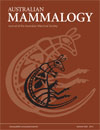
AUSTRALIAN MAMMALOGY
Advancing Knowledge in Animal Science and EcologyAustralian Mammalogy, published by CSIRO PUBLISHING, is a pivotal journal in the fields of Animal Science and Zoology as well as Ecology, Evolution, Behavior and Systematics. With its ISSN 0310-0049 and E-ISSN 1836-7402, this esteemed journal has been instrumental in disseminating critical research findings since 2000, and continues to evolve up to 2024. Ranked in the Q2 quartile of both its categories for 2023, it showcases a diverse array of studies that contribute to understanding Australia’s unique mammalian fauna and its ecological dynamics. Researchers, professionals, and students will find valuable insights in its peer-reviewed articles, which are essential for advancing knowledge in these essential scientific disciplines. Located in Australia at UNIPARK, Locked Bag 10, Clayton, VIC, this journal remains committed to fostering scholarly communication within the global scientific community.

ACTA ZOOLOGICA ACADEMIAE SCIENTIARUM HUNGARICAE
Fostering Excellence in Zoological ResearchACTA ZOOLOGICA ACADEMIAE SCIENTIARUM HUNGARICAE, published by the Hungarian Natural History Museum, is a distinguished open access journal dedicated to advancing knowledge across the fields of Animal Science, Zoology, Ecology, Evolution, Behavior, and Systematics. Established in 2003 as an open access platform, this scholarly journal has actively contributed to the dissemination of critical research since 1996, positioning itself within the Q3 quartile in both its primary fields as of 2023. With its ISSN 1217-8837, ACTA ZOOLOGICA serves as a vital resource for researchers, professionals, and students aiming to explore and expand their understanding of animal biodiversity and ecology. Its publication features a variety of empirical studies, reviews, and critical commentaries that rigorously address contemporary issues in zoological sciences, underlining its commitment to fostering academic excellence and environmental sustainability. Researchers can access the journal’s extensive archives to deepen their inquiry into animal life, making it an essential addition to any academic library.

North-Western Journal of Zoology
Bridging Knowledge Gaps in Zoological StudiesNorth-Western Journal of Zoology is a prominent scholarly publication dedicated to the field of zoology, fostering a vibrant exchange of research findings and insights among scientists, professionals, and students. Published by UNIV ORADEA PUBL HOUSE in Romania, this journal has been a reliable source for advancing knowledge in Animal Science and Zoology since its inception in 2008, with its publications spanning until 2024. With an engaging focus on innovative research and review articles, the journal proudly holds a Q3 quartile ranking in its category for 2023, positioning itself within the competitive landscape of Scopus Ranks. Although currently lacking an open-access model, the journal provides a valuable platform for disseminating critical findings essential to understanding animal biology and ecology. Researchers contributing to this journal benefit from a dedicated readership, furthering the discussion and practical applications of their work in diverse contexts.

ANIMAL BIOLOGY
Advancing Knowledge in Animal Science and EcologyANIMAL BIOLOGY is a distinguished journal published by BRILL, focusing on the dynamic fields of Animal Science and Zoology, as well as Ecology, Evolution, Behavior, and Systematics. With an ISSN of 1570-7555 and an E-ISSN of 1570-7563, this quarterly journal serves as a pivotal platform for researchers and professionals seeking to contribute to the understanding of animal biology across diverse ecological contexts. The journal is recognized with a 2023 Scopus ranking of #234 out of 490 in the Animal Science and Zoology category, placing it within the 52nd percentile, alongside a rank of #409 out of 721 in Ecology, marking a solid contribution to the field. Although it currently holds a Q3 quartile in both categories, its commitment to quality research and novel insights continues to bolster its significance within the academic community. The open access option coupled with its publication history from 2003 to 2024 ensures a wide dissemination of knowledge, drawing in a global audience of researchers, professionals, and students eager to explore the intricacies of animal biology. By promoting high-quality discussions and innovative studies, ANIMAL BIOLOGY plays an essential role in advancing the understanding of life sciences and the evolution of biodiversity.
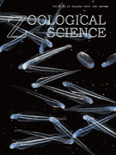
ZOOLOGICAL SCIENCE
Bridging Theory and Practice in Zoological ResearchZoological Science, published by the Zoological Society of Japan, is a leading journal dedicated to the fields of animal science and zoology. With its ISSN 0289-0003, this respected publication has established itself as a prominent source of scientific research, attaining a commendable Q2 ranking in the 2023 category of Animal Science and Zoology. Spanning over three decades, from 1992 to 2024, the journal offers a valuable platform for scholarly articles that explore various aspects of zoology, including ecology, behavior, and evolutionary biology. Although it operates under a traditional subscription model, its contributions are supported by a robust community of researchers and professionals who value its insights. The journal strives to foster academic discourse and insights that drive understanding and conservation of wildlife, making it an essential resource for students and established experts alike. The publishing headquarters located in Tokyo, Japan, further enhances its international reach and influence in zoological studies.
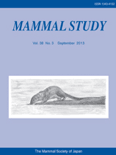
MAMMAL STUDY
Fostering insights into the intricate lives of mammals.Mammal Study, published by the Mammalogical Society of Japan, is a leading academic journal dedicated to the field of mammalogy and related biological sciences. Since its inception, it has provided a critical platform for researchers, professionals, and students to share their findings and insights into the diverse facets of mammalian biology, ecology, and conservation. The journal, with ISSN 1343-4152 and E-ISSN 1348-6160, is recognized for its rigorous peer-review process and has attained a commendable Q3 ranking in the 2023 category of Animal Science and Zoology. With an impact factor reflecting its growing influence—ranking 283 out of 490 in Scopus—we welcome contributions that advance the understanding of mammalian species and their habitats. While access to published articles is through traditional channels, the journal aims to reach an even wider audience by fostering greater awareness and appreciation for mammalian research and conservation efforts. The Mammal Study has converged years of insightful publications from 2008 to 2024, solidifying its position as a vital resource in the biological sciences.
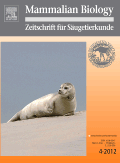
MAMMALIAN BIOLOGY
Exploring the Wonders of Mammal Ecology and BehaviorMammalian Biology is a premier peer-reviewed journal published by Springer Heidelberg, dedicated to the field of mammalogy and related disciplines. With an impressive impact factor and categorized within the top quartiles (Q1 and Q2) of Animal Science, Zoology, as well as Ecology, Evolution, Behavior, and Systematics, this journal serves as a vital platform for researchers and scholars to disseminate high-quality research findings. The journal’s open access options enhance visibility and accessibility, vital in today's collaborative research environment. Since its inception in 2001, Mammalian Biology has fostered a comprehensive understanding of mammal ecology, behavior, and conservation strategies, ensuring its significant contribution to the field. With a broad scope that encompasses evolutionary studies to ecological assessments, it promises to be an essential resource for professionals and students alike who aim to keep abreast of the latest advancements in mammalian studies. Located in Germany, the journal continues to thrive, adapting to emerging scientific inquiries and supporting the ongoing dialogue in mammalogy until at least 2024.
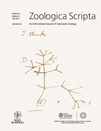
ZOOLOGICA SCRIPTA
Unveiling the mysteries of the animal kingdom.Zoologica Scripta, published by Wiley, stands as a distinguished journal within the fields of Animal Science and Zoology, Ecology, Evolution, Behavior and Systematics, Genetics, and Molecular Biology. With its inception dating back to 1971 and a convergence year extending to 2024, this journal consistently provides a platform for high-quality research, earning a Q1 ranking in two key categories and solid performance in additional fields, as evidenced by its significant Scopus rankings and impressive percentiles. Notably, it ranks 36 out of 490 journals in Animal Science and Zoology, placing it in the 92nd percentile. While Zoologica Scripta operates under a traditional access model, its rigorous peer-review process ensures that only the most impactful studies make their way into its pages. With a focus on advancing our understanding of biodiversity and evolutionary processes, this journal is indispensable for researchers, professionals, and students committed to the ongoing exploration of animal sciences and ecological studies.

HYSTRIX-Italian Journal of Mammalogy
Unveiling Insights into Mammals and Their ConservationHYSTRIX-Italian Journal of Mammalogy, published by the Associazione Teriologica Italiana, is a prestigious open access journal that has been at the forefront of mammalogy research since 1986. With an ISSN of 0394-1914 and an E-ISSN of 1825-5272, this journal is uniquely positioned in the realms of Animal Science, Zoology, and Ecology, as reflected in its Q2 and Q3 quartile rankings for the year 2023. Based in Italy, it serves as a prominent platform for the dissemination of groundbreaking research and studies, striving to foster a deeper understanding of mammalian biology and conservation. The journal's commitment to open access ensures that knowledge is readily available to researchers and students worldwide, bolstering the global academic community. With a dedicated editorial team, HYSTRIX invites contributions that cover a wide array of topics encompassing ecological evolution, behavior, and systematics of mammals, driving forward the discourse in these vital fields.

ZOOLOGICHESKY ZHURNAL
Delving into the dynamics of ecosystems and species behavior.Zoologichesky Zhurnal, a prominent journal in the field of Ecology, Evolution, Behavior and Systematics, has been a vital publication since its inception in 1950. Published by MAIK Nauka-Interperiodica in the Russian Federation, this journal has established a notable reputation in disseminating scientific research and advancing knowledge in zoology. With its coverage spanning from 1950 to 2023, and a specific convergent focus during 1982-1983, this journal contributes significantly to the ecological and evolutionary sciences, even though it currently holds a Q4 classification in the 2023 category quartiles, indicating its niche positioning among peers. Researchers and students engaged in the study of biological sciences, particularly those interested in the dynamics of ecosystems, behavior of species, and evolutionary processes, will find valuable insights and original research articles within its pages. While access to this esteemed journal is not open, it remains an essential resource for those seeking to deepen their understanding of zoological sciences.